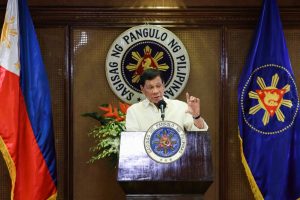Philippine President Rodrigo Duterte has ordered the military to stop a probe into how his security detail received unauthorized Chinese coronavirus vaccines, even though no shots have been approved for use in the country.
The military canceled its plans to investigate the inoculations, which Defense Secretary Delfin Lorenzana has said were “smuggled” into the Philippines from China.
Duterte on Monday ordered soldiers from the Presidential Security Group (PSG) not to reveal details of how or why they obtained COVID-19 vaccines in September and October, saying they should “stay put in the barracks” rather than cooperating with investigators.
Duterte also told his detail not to comply with legislative investigations, although the Senate still plans to open a probe into how the vaccines were illegally transported, distributed, and administered.
Brigadier General Jesus Durante, who heads Duterte’s security detail, said the PSG soldiers injected themselves with a Chinese vaccine to protect the president from the virus. Durante claimed Duterte did not know about the injections until the soldiers had each received two doses of the vaccine.
Philippine media has reported that the soldiers received doses of the China-made Sinopharm vaccine, which is applying for emergency use approval in the country this week.
The president’s office said the vaccine had been offered by China as a “gift,” which would violate laws against transporting unauthorized medicine and could lead to scrutiny of why Beijing allowed doses of the unapproved vaccine to leave the country.
The military inoculations were not the only unapproved Chinese vaccines to be administered in the Philippines. Interior Secretary Eduardo Ano admitted in December that some Cabinet members had already received COVID-19 vaccines. He did not specify which brand of vaccine had been administered.
At least 100,000 Chinese nationals working in the Philippines have also been injected with unauthorized Chinese vaccines, civic leader Teresita Ang See said on Monday, calling the development “positive” but sharing her concerns that the injections are illegal in the Philippines.
The Philippines hosts hundreds of thousands of Chinese workers, mostly in the online gambling sector. Their presence stokes frequent controversy as gambling centers often employ Chinese nationals without formal work visas.
Harry Roque, Duterte’s spokesperson, brushed off the concerns over the inoculations. “If it were true, then good. Now we have 100,000 less possible carriers of the COVID-19,” he said in a briefing.
Roque also defended the PSG soldiers, saying they “risked their lives to protect our president.” So did Lorenzana, who said their decisions to vaccinate themselves were “justified.”
Health experts, legal observers, and members of the public have repeatedly criticized the vaccinations – which are not only illegal but raise concerns that vaccines could be put up for sale illegally on the private market.
India has announced plans to make COVID-19 vaccines available for private purchase, and other countries may follow. In the Philippines, however, an illicit market for inoculations may already be alive.

































